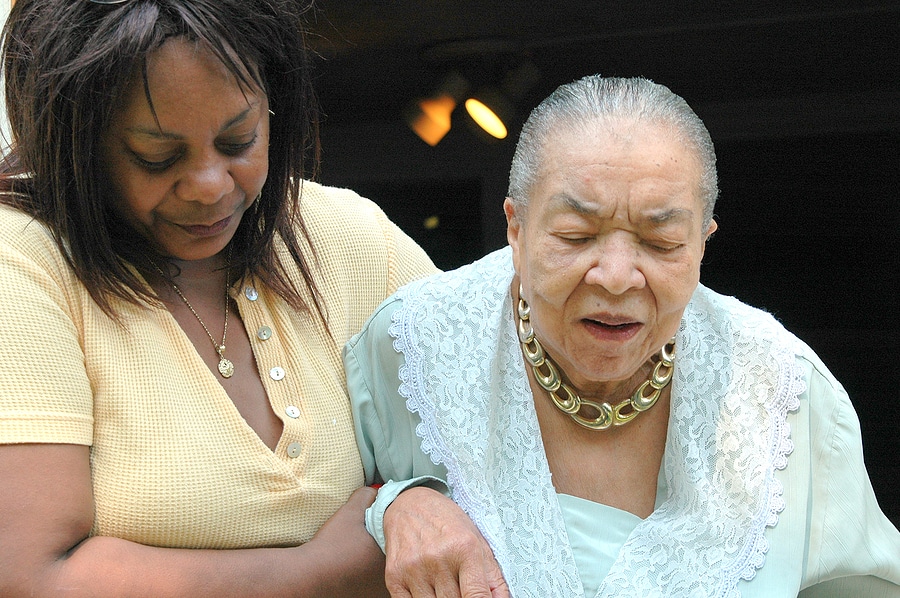Caregivers: Invisible No More

Caregivers are exhausted, fed up, and angry. But all of us, everyone, should be frustrated by the nationwide failure to support caregivers. “Caregiver” is the fastest-growing workplace identity, but employers and the US government still don’t support us. The limited supports we do have are tenuous and are made of a tapestry of informal support that’s overstretched. It’s beyond time for leaders to provide pay equity and institute the protections we need to take time to care. Too many of us don’t have what we need to provide for our families.
Don’t believe me? Ask the families who had to scramble for child care when daycares shut down due to COVID 19 or the daycare employees and owners, overwhelmingly women, who had to find other ways to make money. Talk to women who left the workforce because family caregiver became their responsibility, a necessary choice because caregiving is unpaid, ignored labor.
This National Caregivers Month, I’m doing my part in ensuring that caregivers like me, and the labor we do, are no longer invisible and that our needs are addressed by those we’ve elected.
We’ve already started to do this work. I think of my own family: My mom was my dad’s caregiver until he died recently. My sister supports my mom, and my siblings and I help out as remote caregivers. Fortunately my job allows me to support one of my friends who’s a single mother. We work together to get the kids up and ready for school while making sure we make it to our full-time jobs on time.
Caregivers juggle caring for children and other family members, who sometimes have disabilities that require expensive, intensive care. Caregivers support each other, advising on how to cook a hot meal while offering homework help and ideas for self-care. We do this because we know that those who care are the best support we have. Those who don’t care, like insensitive employers creating family-averse work policies and House Republicans who won’t support paid leave, aren’t.
If our stories aren’t enough, neither are the statistics that confirm our experiences. Caregivers are more likely to be depressed and less likely to have time for self-care. We risk our health by caregiving because we don’t have the support we need. We don’t work for employers who provide paid leave and other benefits. We wait hours to vote, only to be rewarded with milquetoast efforts by our supposed political allies, who are (re)elected to office, only to allow legislation that would actually help to get slashed like trees in the Amazon. We’re expected to work like we don’t have families and care for our families like we don’t have work. And all we have to show for it is less security, more stress, and legislation that disguises robbing social security as a paid leave plan. Just as bad, touted parental-leave-only plans give us a tiny bite of the pie when what we need is to own the bakery.
Perhaps unfriendly work environments and lack of federal support for caregiving are realities because caregiving is largely seen as women’s work and Black women would benefit most from a society that recognizes caregiving as real labor. Maybe caregiving needs a rebrand: A vote for paid leave means women can stay at home. Make the water cooler white male again. Maybe we need more male caregivers speaking up, or maybe we need to show them a world with no caregivers.
We, as caregivers, must demand that we’re seen, that we get an increase in family-sustaining wages, affordable child care and health care, and a comprehensive paid and family leave policy that includes a safe workplace, job protection, and wage replacement. We care for children, show up for elders, partner on care with people with disabilities, and, somewhere in there, pause to care for ourselves. We must call out those who refuse to care for us — even if it means adding another responsibility to our to-do list. But when have we ever ignored a necessary task? Daily we find a way and do what must be done. This fight is no different. Time’s up on those in power who keep pretending we’re invisible.
Malawian-American economic justice advocate Josephine Kalipeni is executive director of Family Values @ Work, a movement network working to win paid family and medical leave, earned sick and safe days, and affordable, high-quality childcare.